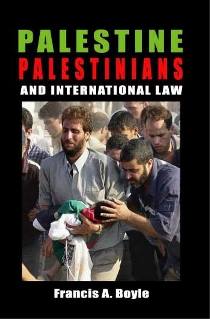Palestine Palestinians and International Law
SYNOPSIS:
No regional crisis has greater potential to affect world peace than the Israeli/Palestinian conflict. None has proved more intractable, and seemingly impossible to resolve. Yet, at the end of the day, most commentators agree that the only solution to the conflict lies in the creation of a viable Palestinian state under the guidance and norms of international law, which alone provides the autonomous legal system capable of rendering objective judgment on the claims of the competing parties.
Palestine, Palestinians and International Law provides a comprehensive survey of the international legal principles related to the Palestinian struggle for self-determination''from the League of Nations Mandate for Palestine awarded to Britain after the WWI, through the partition of the Palestine Mandate by the United Nations after WWII, the Palestinian Declaration of an Independent State in 1988, the diplomatic recognition of the Palestinian State by nearly 130 other states, to the United Nations granting the State of Palestine all rights of a UN member state but the right to vote.
During the past two decades, Francis A. Boyle has provided the leadership of the Palestinian people with advice, counsel, and representation at all stages of this process.
The scholarly analyses that he used to back up this critical work can be found herein.
Boyle also addresses the hypocrisy and double-standards of the Bush Jr. administration's war on international terrorism with special reference to U.S. foreign policy towards the Middle East and the Muslim world after 11 September 2001.
The concluding chapter provides advice and guidance to the current international grassroots Campaign for Israeli Divestment/Disinvestment, inspired by Francis A. Boyle's involvement in the original divestment/disinvestment campaign against the former criminal apartheid regime in South Africa. Today the Republic of South Africa stands as a beacon of hope for oppressed peoples and states all over the world. The same can be true for Palestine and Israel. This book explains why and how that can be done.
ABOUT THE AUTHOR:
Francis A. Boyle is a leading American professor, practitioner and advocate of international law. He was responsible for drafting the Biological Weapons Anti-Terrorism Act of 1989, the American implementing legislation for the 1972 Biological Weapons Convention. He served on the Board of Directors of Amnesty International (1988-1992), and represented Bosnia-Herzegovina at the World Court. Professor Boyle teaches international law at the University of Illinois, Champaign and is author of, inter alia, Defending Civil Resistance Under international Law, The Future of International Law and American Foreign Policy, Foundations of World Order: The Legalist Approach to International Relations 1898-1921, The Bosnian People Charge Genocide, and The Criminality of Nuclear Deterrence. He holds a Doctor of Law Magna Cum Laude as well as a Ph.D. in Political Science, both from Harvard University. Starting in 1987, he served as Legal Advisor to the Palestine Liberation Organization on the Palestinian Declaration of Independence of 15 November 1988 as well as on the ensuing Palestinian Peace Initiative. He then served as Legal Advisor to the Palestinian Delegation to the Middle East Peace Negotiations from 1991 to 1993. There, at the instructions of the Head of the Delegation, Dr. Haidar Abdul Shaffi, the author drafted the Palestinian Alternative to what later became the now defunct Oslo Agreement.
TABLE OF CONTENTS
INTRODUCTION: Standing in Solidarity with the Palestinian People / 11
The Big Lie
Chicago
Harvard
Entebbe Lecture
The Middle East and the American Society of International Law
Israel's 1982 Invasion of Lebanon
Two Bogus Wars on Terrorism
Yaron and Sharon Redux
Speaking for the Palestinians at the UN
Sparring with Jordan
The First Intifada
Creating the Palestinian State
The Palestinian Declaration of Independence
Diplomatic Recognition
The Effort to Accede to the Geneva Conventions and Protocols
The Isolation of the Palestinians
Middle East Peace Negotiations?
The Palestinian Alternative to Oslo
The Status of Jerusalem
Divestment/Disinvestment
Prologue
Chapter 1. Creating The State of Palestine / 25
Introduction
CREATE THE STATE OF PALESTINE!
The League of Nations Mandates for Palestine and South West Africa
The History of Namibia at the United Nations
How to Create the State of Palestine
U.N. General Assembly Sanctions Against Israel
Palestine Versus Namibia
Palestine: One Nation, Two States
PALESTINIAN DECLARATION OF INDEPENDENCE
Statehood Declaration is Part of PLO's Carefully Researched Plan (interview by M. Kay Siblani)
Chapter 2. The International Legal Right of the Palestinian People to Self-Determination and an Independent State of Their own / 58
The Intifadah
The Elements of Palestinian Statehood
Who Controls Palestine?
Palestinian Steps Toward Peace
Self-defense Is Not Terrorism!
The Framework for Negotiating a Comprehensive Middle East Peace Settlement
A Solution for Jerusalem
Human Impediments to Peace
Soviet Immigration to Palestine Violates International Law
Conclusion
CHAPTER 3. The Future Peace of Jerusalem / 71
CHAPTER 4. The Palestinian Alternative to Oslo : A Memorandum of LAW / 78
CHAPTER 5. From the Oslo Accords to the Al Aqsa Intifada / 119
Introduction
Palestinian Good Faith
Labor vs. Likud?
Israel's Bantustan Proposal
The Palestinian Anti-Bantustan Proposal
Secret Negotiations in Norway
Why Did President Arafat Accept What Was Offered in Oslo?
Post-Oslo Agreements
Camp David II
The Israeli Origins of the Al Aqsa Intifada
Security Council Resolution 1322
Israel's Belligerent Occupation of Palestine
The International Laws of Belligerent Occupation
The UN Human Rights Commission Specifies Israeli Actions As War Crimes and Crimes Against Humanity
Israel's War Crimes against Palestinians
Israel's Crimes Against Humanity against Palestinians
The Precursor to Genocide
U.S. Complicity
Oslo is Dead
CHAPTER 6. Preserving the Rule of Law in the War Against International Terrorism / 132
State Terrorism
THE GENEVA DECLARATION ON TERRORISM
Preamble
1. State Terrorism
2. National Liberation Movements
3. Non-international Armed Conflicts
4. The Role of the International Media
5. Conclusion
Defining Terrorism
The Israeli Origins of the Reagan/Bush Sr. Administration's War Against International Terrorism
Terrorism as a Response to the Israeli Invasion of Lebanon
The Reagan/Bush Sr. Administration's War Against International Law
The Perversity Behind the Shultz Doctrine
The Sofaer Corollary
International Law on the Threat and Use of Force
The Illegality of Intervention, Protection and Self-Help
International Legal Means for Responding to the Threat and Use of Force
The Bush Jr. Administration
Bush Jr. Embraces Weapons of Mass Extermination
Bush Jr.'s First-Use Nuclear Terrorism
The Rogue Elephant
CHAPTER 7. What Is To Be Done? / 153
1. UN Suspension of the State of Israel
2. International Law as the Basis for Peace
3. Dump the Dishonest Broker
4. Sanctions
5. International Criminal Tribunal for Palestine
6. World Court Lawsuit for Genocide
7. Divestment/Disinvestment Campaign
How To Support the Israeli Divestment/Disinvestment Campaign
Applying the 1973 Apartheid Convention to Dismantle Israel's Genocidal Apartheid Regime
The Rome Statute for the International Criminal Court
Precedents from Dismantling the Former Criminal Apartheid Regime in South Africa
Conclusion
POSTSCRIPT / 177
APPENDIX I: Bibliography of Genocidal/Apartheid Acts
Inflicted by Israel ON the Palestinians
during the Al Aqsa Intifada / 178
APPENDIX II: BIBLIOGRAPHY ON THE MIDDLE EAST AND
INTERNATIONAL LAW / 201
Index / 203.
Using International Law to clarify and resolve the Israeli Palestinian conflict
By: Francis Boyle - on: Tuesday 1 November 2005 - Genre: Palestine File
Upcoming Events

Sonallah Ibrahim's Ice
June 26, 2025
Join us for a special discussion on Sonallah Ibrah...

Arabia Felix - Alarabia Alsaida in Bayt Yakan
April 15, 2025
Arabia Felix by Thorkild Hansen, and translated by...

A writer, a vision, a journey: a conversation with Professor Ilan Pappe
March 15, 2025
This event took place on 15 March, 2025 . You may...

مسافر يبحث عن ماء
February 17, 2025
تقيم نقابة اتحاد كتاب مصرشعبة أدب الرحلات تحت رعاي...
